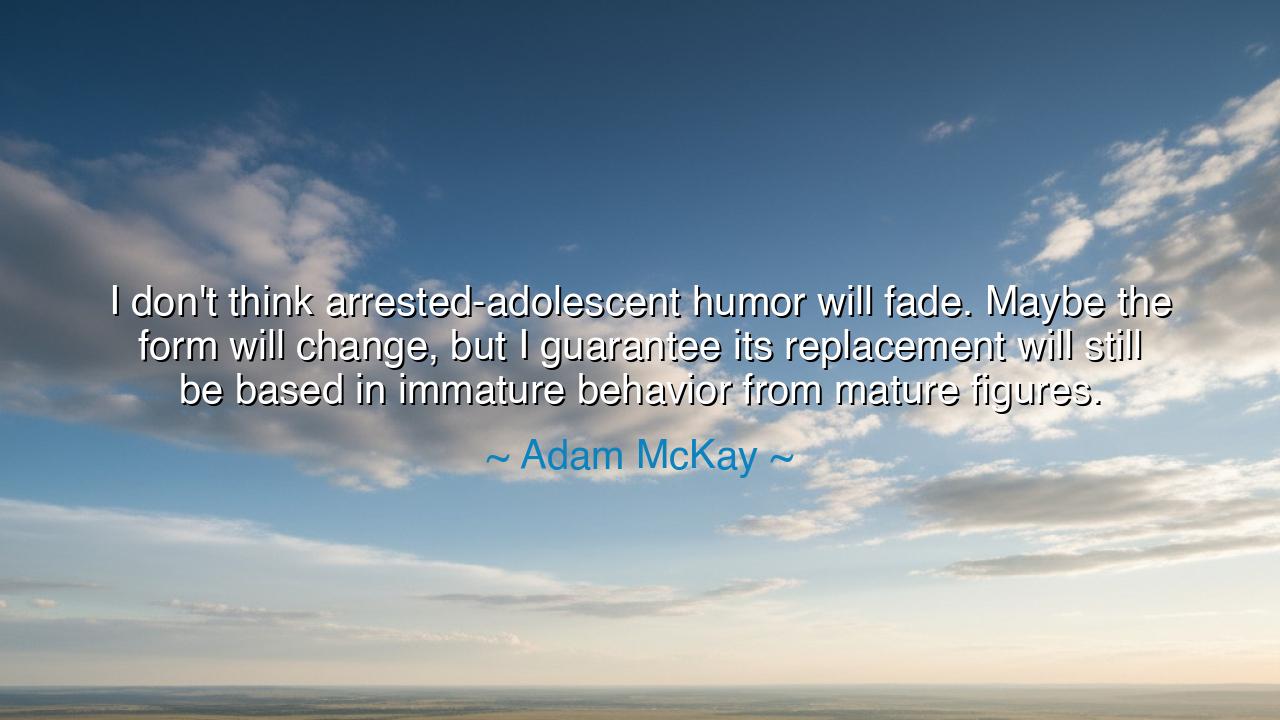
I don't think arrested-adolescent humor will fade. Maybe the form
I don't think arrested-adolescent humor will fade. Maybe the form will change, but I guarantee its replacement will still be based in immature behavior from mature figures.






Hear the words of Adam McKay, a jester of modern truth and a philosopher of laughter, who said: “I don’t think arrested-adolescent humor will fade. Maybe the form will change, but I guarantee its replacement will still be based in immature behavior from mature figures.” These words, though born in the world of comedy, speak to a truth as ancient as man himself—that folly is the eternal shadow of wisdom, and laughter, though often childish in form, is a sacred mirror to the human soul.
In every age, the wise and the powerful have looked upon the antics of the foolish and seen themselves reflected. What McKay names “arrested-adolescent humor” is that peculiar kind of jest born from contradiction—the spectacle of grown men behaving as children, of dignified figures surrendering to absurdity. It is the laughter that erupts when the mask of civilization slips, and beneath the polished armor of adulthood, the trembling heart of the child is revealed. The ancients, who understood the theater of life better than any, saw this pattern and honored it. For they knew that even kings stumble, that even philosophers can be clowns, and that in mockery lies revelation.
Consider the comedies of Aristophanes, performed under the open skies of Athens. His plays ridiculed generals, politicians, and gods alike, portraying them as buffoons caught in their own vanity. The people roared with laughter, not merely out of amusement, but out of recognition. They saw in these farces their own leaders’ follies—the eternal immaturity of those who wield power. And yet, this laughter was not cruel; it was purifying. It stripped away illusion and reminded the mighty that wisdom without humility becomes farce. McKay, in his films, carries the same torch. His humor, though modern in form, springs from this ancient well—the wisdom that sees that even maturity, if taken too seriously, becomes a kind of foolishness.
Immature behavior from mature figures—that is the dance of comedy through the ages. It is the court jester mocking the king, the philosopher laughing at his own despair, the actor stumbling upon truth while pretending to be a fool. Why does such humor endure? Because it speaks to the duality of the human soul. We grow older, we adorn ourselves with titles, duties, and decorum—but the child within us never dies. The part of us that is reckless, curious, clumsy, and joyous waits always for release. In laughter, we honor that child. And when those who appear most composed falter into foolishness, we are reminded that humanity itself is a fragile and wondrous performance.
McKay’s insight, then, is not merely about comedy, but about condition—the truth that civilization is built upon contradiction. The world demands maturity, but the heart demands play. We praise reason, yet we are ruled by emotion. We build systems, only to watch them crumble in chaos. The laughter that comes from seeing mature figures behave as fools is not mockery alone—it is empathy. It tells us that perfection is a lie, that life is not meant to be borne with stiffness, but embraced with wonder. The wise laugh not because they despise humanity, but because they understand it too deeply.
There is a story told of King Solomon, famed for his wisdom. Once, while walking through the marketplace, he saw a clown juggling before a laughing crowd. His servants expected him to pass by in silence, but instead the king stopped and applauded. When questioned, he said, “Even this fool teaches me wisdom—for he reminds me that joy, like truth, must be kept in motion or it falls.” So too does Adam McKay remind us that humor, even when childish, is the pulse of human honesty. It thrives because it reveals what we hide, and heals what we suppress.
Let this be the lesson, then: do not despise laughter born from foolishness, for in it lives the soul’s rebellion against pretense. The one who can laugh at his own absurdity walks lightly through the world. Do not chase the illusion of constant seriousness, for that is the heaviest of chains. Let humor temper wisdom, as the wind tempers flame. For the laughter of the fool may seem simple, but often it speaks the deepest truth—that the path to enlightenment is not through denial of our folly, but through the full-hearted acceptance of it.
Thus, remember the words of Adam McKay: the forms of humor will change, but the essence will endure, because mankind himself does not change. Beneath the robes of scholars, beneath the crowns of kings, beneath the polished armor of modern life, the eternal child still laughs. Let that laughter be your companion, your teacher, and your freedom. For when we laugh, we do not fall from grace—we return to it.






AAdministratorAdministrator
Welcome, honored guests. Please leave a comment, we will respond soon